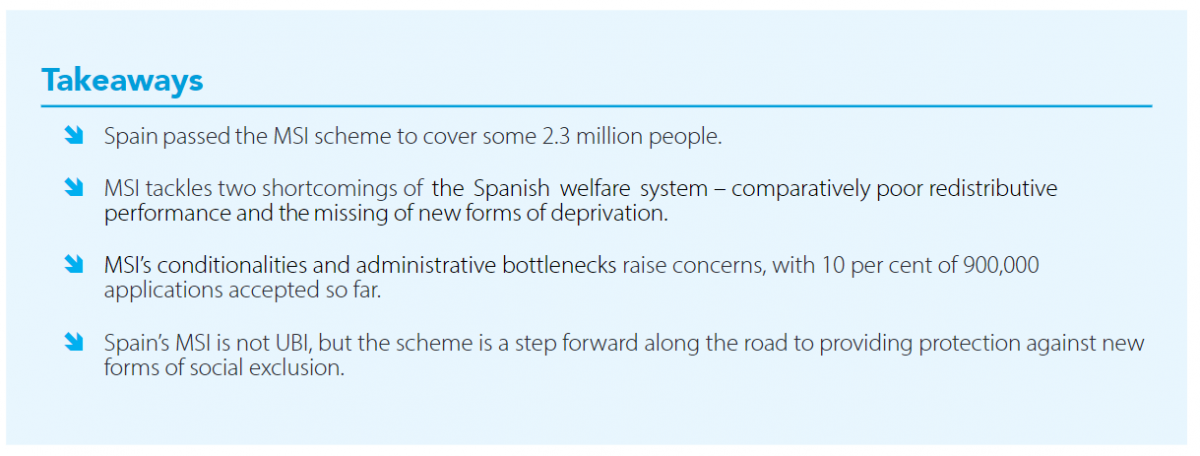The following article is authored by Jordi Sevilla.

In June 2020, the Spanish Congress of Deputies passed, with no votes against, the Minimum Subsistence Income (MSI), a new non-contributory Social Security benefit with two objectives: to reduce extreme poverty in Spain and to assist the labour integration of people at risk of exclusion. Other European countries have had similar instruments for some time, whereas in Spain the autonomous communities were responsible for the matter. It is intended to reach 850,000 households, which amounts to some 2.3 million people.
The way it is designed, the MSI absorbs the former child benefit (child poverty is very high in our country), fixes a minimum amount that is equal throughout Spain but depends on the family circumstances of the recipients, and the support provided by the autonomous communities is to be deployed on top of it. It also establishes a sort of wage supplement, with a view to helping its recipients to enter the labour market. It is therefore an ongoing benefit, not linked to the exceptional situation caused by the pandemic, and as such, different from the one-off payments proposed by some as a quick income replacement measure in the face of the lockdowns, as have been passed in other countries.
The shortcomings of the Spanish welfare state have been attracting criticism for a long time, particularly in two essential aspects: it is less redistributive than other comparable systems (it reaches lower-income brackets to a lesser extent) and it ignores new forms of poverty and exclusion that are becoming structural (they diminish in the presence of growth, but do not disappear). The purpose of the MSI is to address both of these aspects, and in this respect must be viewed as a positive measure.
However, one gets the impression that out of all the possible options (the trade unions Unión General de Trabajadores and Comisiones Obreras submitted a proposal in 2016 as a Popular Legislative Initiative) the one with the lowest cost and the stiffest bureaucratic demands for its eligibility was chosen. This may be seen as an attempt to avoid criticism from those who described the measure as “pocket money” with no strings attached, which would kill its beneficiaries’ incentive to work.
With so many conditioning factors, an administrative bottleneck has formed, as a large number of incomplete applications have had to be supervised in detail. This threatens to leave without coverage too many potential beneficiaries who nevertheless have major problems meeting the requirements and even filling in the forms, as a result of which they may well receive the benefit several months late, albeit, as the government insists, with retroactive effects. Over and above the administrative problems (out of the nearly 900,000 applications submitted, hardly 90,000 have been accepted), some critics have insisted that the instrument falls short in ambition and economic coverage, and may leave many beneficiaries in the same situation as before, if the autonomous communities withdraw or reduce their integration income because of the existence of one provided by the central state.
Although there has been some confusion on the subject, the Minimum Subsistence Income has nothing to do with the proposals for a Universal Basic Income (UBI) that have been circulating for some time. They differ in at least two fundamental elements: whereas the MSI is a benefit conditional on being poor and in exchange requires entry into the labour market, the UBI is based upon a guarantee of freedom (if you can’t subsist, you’re not free), is universal and is conditioned by no requisite other than being a citizen.
We can conclude, then, that the MSI passed in Spain is a step forward along the road to providing social policies with sufficient elements to combat new forms of social exclusion, but that perhaps it has been defined very restrictively (the need to relax some of its requirements is beginning to be considered), sacrificing effectiveness and scope in exchange for a broad political consensus.
Listen for more
Basic Income – deciphering the promises and the data
Close social protection gaps to reset equitably after COVID-19
Universal Basic Income and beyond - what are our options for recovery
…
Jordi Sevilla is an economist and a Member of the Senior Corps of State Trade Experts and Economists. He has held several posts in the administration, including Chief of Staff to the Minister of Economy and Finance (1993-1996). He was subsequently appointed Minister of Public Administrations (2004-2007), passing the Law on Electronic Government and the Basic Statute of the Civil Service. He is one of the first defenders of the concept of a universal basic income in Spain. He is also a frequent collaborator of the Social Observatory of “la Caixa” where he authored “Strengthening social welfare: from minimum income to basic income”.
The author is responsible for the facts contained in the article and the opinions expressed therein, which are not necessarily those of UNESCO and do not commit the Organization.
